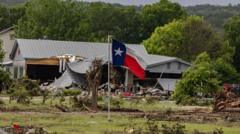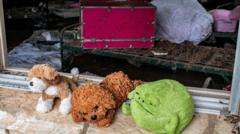Following a failed launch for the second time in a row, SpaceX's Starship rocket exploded soon after leaving Texas, prompting safety alerts and impacting local air travel. No injuries reported, but debris showered islands in the Caribbean, causing flight interruptions across Florida airports.
SpaceX's Second Consecutive Rocket Failure Sparks Safety Concerns and Flight Delays

SpaceX's Second Consecutive Rocket Failure Sparks Safety Concerns and Flight Delays
A SpaceX Starship rocket exploded shortly after takeoff from Texas, leading to grounded flights and warnings about falling debris over the Caribbean.
A SpaceX Starship rocket met with disaster shortly after its launch from Texas on Thursday, marking its second consecutive failure and reigniting safety fears over falling debris. The uncrewed ship, which experienced what SpaceX termed a "rapid unscheduled disassembly" shortly into its ascent, lost contact with mission control. Despite the mishap, there were no reported injuries or property damage, although individuals in Caribbean islands shared alarming visuals of fiery debris cascading from the heavens.
This mission was particularly significant as it was the eighth test of SpaceX's Starship, designed to be the largest and most powerful rocket in history. The extensive 123-meter rocket was intended to achieve orbit over the Indian Ocean and return to Earth after one hour. While the Super Heavy booster successfully returned to the launch pad, the main vehicle spiraled out of control.
SpaceX, founded by billionaire entrepreneur Elon Musk, promptly began coordinating efforts with safety officials to activate "pre-planned contingency responses." In an official announcement, SpaceX indicated that data from the launch would be analyzed to discern the root cause of the failure, noting that several engines had ceased functioning prior to the explosion. "As always, we adapt and learn from our challenges, and today's flight will provide valuable insights for future improvements on Starship's reliability," the company stated.
Concerns about falling debris led to temporary flight halts and delays across multiple Florida airports, including hubs in Miami and Orlando. The Federal Aviation Administration (FAA) confirmed that numerous flights were affected due to the incident. This latest explosion comes on the heels of a previous test in January, during which another Starship rocket failed just minutes after its launch from the same facility. The FAA had already restricted Starship launches after the January explosion caused property damage in affected Caribbean regions.
Reports indicate that the recent launch occurred before the FAA had completed its investigation of the January incident. In response, the government of the Turks and Caicos Islands stated they were in communication with U.S. authorities and SpaceX to keep the public updated on safety efforts.
As footage circulated on social media showing flaming debris falling over the Caribbean Sea, residents in the Bahamas noted they were seeking shelter to avoid potential hazards. The ambitious Starship program is essential for Elon Musk's vision of interplanetary travel, particularly the long-term goal of Mars colonization. Additionally, NASA aims to adapt a modified version of the Starship as a critical component of its Artemis missions, which plan to return astronauts to the moon.
The series of setbacks raises serious questions regarding safety protocols and the implications of rapid development in commercial space flight, particularly as SpaceX seeks to establish itself as a leader in the industry.




















